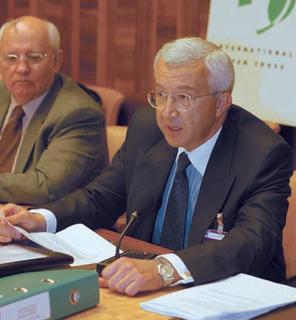Your Hero Defends the Right to Water

Who’s your favorite living hero? Mine is Mikhail Gorbachev. Yours may be Leonardo DiCaprio. Both our heroes are working to save the world — primarily by showing the rest of us that what we do also matters. Take water use, for example. What could be more mundane than washing clothes, say, or repairing sewers, or digging a tube well in the desert? But if these jobs seem dull, it’s only for a lack of vision about the whole picture. Although our planet is mostly water, only a tiny portion of it can be used for human consumption — and that portion is unfairly distributed, often wasted, and increasingly polluted. Hence, every action that conserves fresh, safe water or makes it more accessible to others is a worthy contribution. So I congratulate you for watering your flowers early this morning instead of during the day! We share a grand project, all the components of which may seem trivial — except in context.
What do Gorbachev and DiCaprio have to do with it? They are admired public figures who have a vision and who remind us of what we actually knew. We need our heroes. Gorbachev gives speeches promoting his great idea: a new Global Treaty on the Right to Water. And the actor Di Caprio has helped produce a short documentary film that explains and supports Gorbachev’s proposal. It will soon be available in the United States through Global Green, the American affiliate of Green Cross International, the organization that Gorbachev founded. Both of those heroes can touch your heart and make you want to fix your leaky faucet and sign a petition demanding better stewardship of the planet‘s water. Entertainers and visionary public figures probably save more lives than risk-taking heroes. However, they may never meet anyone whose life they saved. Nor will you or I, though what we do also matters.
More than 1.2 billion human beings lack clean water. About 2.5 billion people lack water sanitation services, and five million people die from waterborne diseases each year. According to the president of Green Cross International, Dr. Alexander Likhotal (shown above with Mr. Gorbachev), diarrhea has killed more children in the past ten years than all the people who were killed in armed conflicts since World War II. For about $50 per person, such misery can be overcome. One of the key Millennium Development Goals is to halve the number of people without access to water services by 2015.
The Global Treaty on the Right to Water will bring us closer to that goal. When ratified by the member states of the United Nations, it will give citizens a tool to assert their right and will require national governments to see that the right is respected. The right to water already has been enshrined in several UN human rights treaties, but none of them are legally enforceable. This new treaty, however, will obligate states to incorporate those rights into their national laws and implement them without discrimination. Thereafter, legal redress will be available for any violations. If you visit http://www.watertreaty.org you can read a draft of the proposed treaty and also sign a petition asking your government to support it.
The treaty will establish that water is not a commodity but rather a public good. To be sure, the provision of water services can be costly. However, it must be equitable, ensuring that water — whether provided publicly or privately — is affordable to all, including socially disadvantaged groups.
The campaign also distinguishes between various uses of water — particularly between “water for life” (i.e. clean, safe, sufficient water to satisfy human needs for drinking, hygeine, cleaning, cooking, subsistence agriculture and sanitation) and “productive water” (the efficient use of water in activities of economic value, such as commercial farming and manufacturing). Water for life must take priority over all commercial uses.
Naturally, Green Cross International does not suggest that a treaty alone can resolve all the practical problems involved in providing water. Scarcity is a fact of life in many areas, and technological ingenuity is required to develop solutions. The purpose of the initiative is to institutionalize the provision of water services as a human right, subject to clear principles of equity and sustainability. To learn more, visit http://www.globalgreen.org/ or http://www.gci.ch/.



1 Comments:
One important distinction the Green Cross initiative makes is between water for life and water for productive uses -- i.e. profit. An international treaty would bind countries legally to provide water services for life (drinking, cooking, personal hygeine, local farming for subsistence, etc.) but other arrangements could apply to commercial purposes. I don't necessarily that markets would improve the access of poor people to water for life, but I do think it's necessary to charge something for water, and when it comes to commercial uses, charge significant amounts. That's primarily to keep people from wasting water. Anything that's free can be squandered, whereas we need to find ways of making existing supplies stretch father.
Post a Comment
<< Home